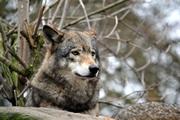Myth Matters: Werewolves, Dogmen and Biopolitics in World Literature
- Date: Fri, 11, 2:00 pm - Sat, 19 Mar 2016, 4:30 pm
- Location: Room 618, Napier Building, The University of Adelaide
- Contact: J.M. Coetzee Centre for Creative Practice +61 8 8313 9164
- Email: jmcoetzeecentre@adelaide.edu.au
A Masterclass Series with Professor Peter Arnds, Trinity College Dublin
- Week 1: Wednesday 11 May and Thursday 12 May, 2 - 4.30pm
- Week 2: Wednesday 18 May and Thursday 19 May, 2 - 4.30pm
- Room 618, Napier Building

Where do we draw the line between human and animal? What do mythical creaures, like werewolves, tell us about how we see ourselves? During the Middle Ages, at the interstices of myth and history, the human wolf was an outlaw who had become morally unclean and was consequently abandoned by the community to be killed by anyone with impunity.
In lycanthropy (the transformation of a human into a wolf), myth and the politics of persecution come together, a point I have elaborated on in my recent monograph, Lycanthropy in German Literature (Palgrave Macmillan 2015). In this work, I argue that the human wolf of the Germanic Middle Age - as a symbol of both power and parasitism, sovereignty and abjection – is an iconic representation of biopolitics in the German cultural imagination from the early modern age through to post-war literature. In this monograph, I trace the ways the metaphor of the wolf has transformed over time and the way it has epitomized shifting cultural anxieties, from religious and superstitious fears to psychological or racial ones. The wolf in German culture is a symbol both of society’s fear of human vice (idleness, vagrancy, crime) and a metaphor of sovereign power, specifically of resistance to foreign invasion or against social conformity. My historical mapping of key moments of lycanthropy in German literature reveals how the metaphor of the wolf degraded over time, culminating in the reduction of the symbol of the wolf from medieval outlaw to that of vermin of a lower order (lice, rats) in the context of genocide.
This four part masterclass series expands this analysis of German lycanthropy and biopolitics to world literature to investigate whether we can detect universal aesthetic responses to political violence or whether different cultures and their traumatic pasts produce varying aesthetics. Canine metaphors and myths based on metamorphoses will serve as a central representative tool of investigation, due to the way the practice of reducing humans to animals facilitates processes of abjection and genocide.
Are there similar developments in other cultures? What does tracking these metaphors and their etymological and linguistic development reveal about a culture over time? While in Western, Christian societies the wolf is considered to be demonic and a pest due to his trespassing through the lands of sedentary peoples, in pre-Christian cultures (such as ancient Rome) and some contemporary Eastern cultures (i.e. in Mongolia) the wolf is revered. This master class series will consider whether there is a universal metaphorical and myth-steeped human language that tends to reduce some individuals to the level of the non-human, or whether there are exceptions among peoples that are less technologically developed, more nomadic, and more closely connected to their mythical beginnings.
Participants in the classes should try to familiarise themselves with the following works: Franz Kafka, The Metamorphosis; J.M. Coetzee, Disgrace; David Malouf, An Imaginary Life; the Grimm Brothers "Little Red Riding Hood" and "The Wolf and the Seven Kids."

Peter Arnds is Associate Professor and Director of Comparative Literature and the Centre of Literary Translation at Trinity College Dublin, where he also teaches in the German and Italian departments. His academic interests range from eighteenth-century authors to post-Holocaust literature, magical realism, the satirical visual arts, the wolf-man, travel literature, and translation theory. His has published six books, including Representation, Subversion and Eugenics in Günter Grass’s The Tin Drum (2004) and Lycanthropy in German Literature (2015). Peter has edited a volume on Translating Holocaust Literature (2015), translated Patrick Boltshauser's novel Stromschnellen (Rapids, 2014), and published a collection of poetry and water colours called A Rare Clear Day (2015). He has also published short stories in literary journals the world over and was writer-in-residence at the Heinrich Boell Cottage on Achill Island, County May, Ireland. He is Visiting Professor at the J.M. Coetzee Centre for Creative Practice in 2016.
To register for these masterclasses, please contact: rita.horanyi@adelaide.edu.au
